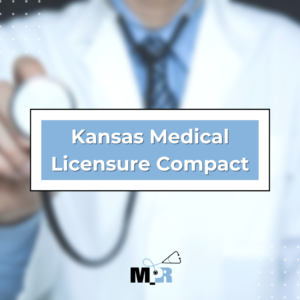Interstate Medical Licensure Compact: Standards and Requirements
Physicians providing medical care to patients in the state of Kansas are required to hold an active Kansas license. Since 2017, physicians have had a faster pathway to licensure through the Interstate Medical Licensure Compact (IMLC). This pathway became extremely popular during the COVID-19 pandemic with the increase in telemedicine/telehealth delivery of health care.
 The Interstate Medical Licensure Compact is a voluntary path to licensure for qualified physicians who wish to practice in multiple states. It is available to those who hold a Doctor of Osteopathy (DO) or Doctor of Medicine (MD) and is designed to increase access to health care.
The Interstate Medical Licensure Compact is a voluntary path to licensure for qualified physicians who wish to practice in multiple states. It is available to those who hold a Doctor of Osteopathy (DO) or Doctor of Medicine (MD) and is designed to increase access to health care.
This is particularly needed in underserved and rural areas. The mission is accomplished by making it possible for physicians to extend the reach of their practice, improving patient access to medical specialists, and leveraging the use of new medical technology.
Participating States agree to common standards of licensure that can be verified once (by the State of Primary Licensure – SPL) and accepted by all to create an expedited process. There are currently 8 common standards that have been agreed to by the participating states:
- Medical school accreditation: LCME, COCA, WDMS
- No more than 3 attempts at USMLE or COMPLEX-USA
- Graduate Medical Education accreditation by ACGME or AOA
- ABMS or AOA-BOS including time-limited certificates
- No prior convictions or criminal activity
- Clean DEA history
- No active investigations
- Successful passing of FBI Criminal Background Check
The IMLC for physicians requires the license to be issued by the member state’s licensing board and is subject to that state’s practice of medicine. The State of Principal License (SPL) selection requirements include: 1) holding a full, unrestricted medical license in a Compact Member state, 2) meeting at least one of the following requirements:
- Principal residence of the physician is in the SPL
- At least 25% of the physician’s practice of medicine occurs in the SPL
- The employer is located in the SPL
- The SPL is the physician’s state of residence for US federal income tax purposes
The Interstate Medical Licensure Compact Commission (IMLCC) is created by each member board state when legislation is passed and signed by the applicable state governor. This action makes the IMLCC a part of that state’s government. The IMLCC has an Executive Director with oversight of the IMLCC.



